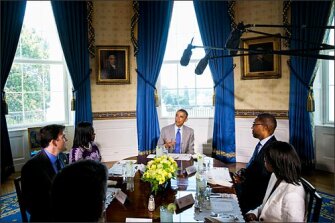
What if you got a chance to sit down with the president of the United States and the secretary of education over lunch and tell them where you think the nation is going wrong—and right—when it comes to K-12 policy?
Four teachers—all of whom have spent at least a decade teaching at high-need schools, many in the same communities that they grew up in—got the opportunity to do just that on Monday. So what did they tell President Barack Obama and U.S. Secretary of Education Arne Duncan? And what was it like to eat at the White House?
To find out, I spoke with two of the teachers—Justin Minkel, a second grade teacher in Springdale, Ark., and Dwight Davis, who teaches 5th grade in Washington, D.C. Minkel was the 2007 Arkansas Teacher of the Year, and he blogs for Education Week, over at Teaching for Triumph: Reflections of a 21st Century ELL Teacher. And Davis is a teaching policy fellow with Teach Plus.
First things first. What was for lunch?
Not school cafeteria fare. Grilled salmon with green peas, a watermelon and feta salad, cobbler with ginger ice cream and lemonade. Minkel thought he’d be too nervous to eat, but he managed. Both gave the food—and the “free flowing discussion” two thumbs up.
What did President Obama want to know?
Obama’s first question had to do with the teachers and their backgrounds: Why had they continued to work with needy populations for their entire careers, and what can the federal government do to help support more teachers who want to work with disadvantaged kids, and stay in those jobs for the long haul?
And what did the teachers tell him?
Some of the toughest parts of being a teacher aren’t what people expect. They include having to cope with bureaucracy, and not having as much as autonomy as other proven professionals, Minkel said. “It’s not the kids that are keeping teachers from low-income schools,” he added.
President Obama also asked for suggestions on how to improve the profession. What did the teachers recommend?
They want more time to collaborate with each other, and the opportunity to feel like they have more say over what goes on in their own classrooms. And Minkel wanted the president and secretary—who have presided over the biggest shift in the federal role in teacher evaluation in recent history—to know that there aren’t really “good teachers and bad teachers” so much as “good teaching and bad teaching.” Only a “small minority of teachers don’t care about kids,” he said.
Many teachers are concerned about the overuse of standardized testing. Did that come up?
Yes! In fact, the president himself asked the teachers if there is too much testing. Davis told him that he thinks some types of assessments can be really beneficial to both students and teachers, allowing kids to gauge their own progress and making it possible for teachers to pinpoint students’ weaknesses. “I believe students want to be assessed,” Davis said.
But some tests don’t provide that kind of information. “All I get is averages,” Davis said. “All I get is assessment for the sake of assessment.”
What did else they talk about?
Their students, and even their own children. Obama talked about his daughters and their educations. Minkel told the president about how he started a program to build home libraries for students in his class. He saw a dramatic improvement in their reading abilities, particularly for one child whose parents aren’t native English speakers, she read at home to her mother and her younger sister. And Davis told him about his practice of choosing culturally relevant texts his students can relate to. (He’s a big fan of Thank You, Mr. Falker, about a struggling reader.)
A cynical reporter who writes a blog about education policy and politics in Washington would say the president and secretary choose to have lunch with teachers to send a message to folks who have questioned the direction of federal K-12 policy, or maybe even called for Duncan’s resignation. Did Davis and Minkel ever feel like props?
This drew an emphatic no, from both teachers. “If we were props, [President Obama] would have just stuck to his talking points,” Davis said. “He sat back and he literally listened.” Minkel had a similar take. “I thought of it as genuine,” he said. “His questions were so thoughtful. They were respectful.”
Photo: President Barack Obama hosts lunch for a group of teachers in the Blue Room of the White House on July 7. From left clockwise are teachers Justin Minkel and Leslie Ross, President Obama, and teachers Dwight Davis and LeShawna Coleman.—Kristoffer Tripplaar/Sipa USA/AP
